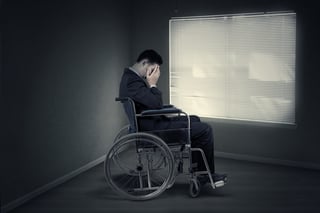 A claims department functions because of loss to property, an accident, or an injury due to legal liability, misfortune, negligence, or other risk. Without these losses, there would be no service to provide.
A claims department functions because of loss to property, an accident, or an injury due to legal liability, misfortune, negligence, or other risk. Without these losses, there would be no service to provide.
With a physical injury, not only is there the injury itself, there may also be emotional pain, interruption to daily activities, multi-faceted adjustments related to the healing process, and the ensuing effects of all these consequences. Walking, dressing, driving, cooking, eating, and working can all be affected. This adjustment can place demands on other members of the household or significantly challenge someone who’s limited in resources or support.
What often goes unnoticed (and in some cases untreated) are the psychological effects of an injury. Imagine living by yourself and sustaining a rotator cuff tear to your dominant arm. How will you adjust to being disabled from work after surgery, trying to get much-needed rest, bathing, dressing, grocery shopping, doing laundry, etc.? Sometimes this is compounded by concerns about having a job to return to, or the uncertainty of a full recovery or permanent injury.
As a workers' compensation claims adjuster, I’ve heard comments from injured workers about how their injuries affected them in ways that go beyond the statutes and policy benefits; for instance, holding their young children or grandchildren, side effects from pain medications, fear of job loss, the inability to maintain personal hygiene and grooming, the inability to drive their children to or from school and other activities, or maintaining their homes. For many, these daily activities enrich their lives and their family members’ lives. When encumbered, the injured parties can be subject to non‑physical consequences, like varying degrees of depression.
Studies have shown there’s a higher prevalence of depression after workplace injuries, typically up to three months after the injury occurs. Coupled with physical injury, post-injury depression can prolong recovery, delay return to work, and complicate the resumption of pre‑injury function and activity levels. If the psychological effects are diagnosed and treated in conjunction with the physical injury, this will add time, resources, and money to the management of the physical injury, including longer periods off work, possible counseling, and added prescription costs.
The psychological effects can add to the many peripheral factors that impact claims handling, like age, lifestyle, family dynamics, pre‑injury physical and mental health, the availability of support resources, the means for help, genetics, or personal stressors. But since psychological components are usually not addressed by the emergency room, family doctor, or orthopedic specialist, the responsibility of this awareness can fall on the claims handler, depending on the disclosure of these related factors.
The extent of post-injury depression can be a very wide spectrum, may be hard to detect, and can otherwise be displayed in different ways. Symptoms can be an altered mood, adjustment disorder, personality manifestations, no interest in participating in daily activities, or a lack of advocating for their own recovery. The motivation to return to work, the claimant’s outlook on the prognosis, involvement in the recovery process, dependency on medications, and a lack of interest are areas where these symptoms might surface.
Since the severity and impact of undiagnosed or untreated post-injury depression can be latent and unaddressed, this can add complications to the claims handling. The claims handler should keep this possibility of post-injury depression in mind and maintain sensitivity and compassion if they find concerns. Each jurisdiction and its related workers’ compensation statutes address “physical - mental” injuries and any potential coverage differently and may require additional statutory review or consultation with legal counsel. This would also require discretion should this be discussed with the employer regarding any resources they might have to offer, like an EAP, with consideration of HIPAA.
To help promote the injured party’s recovery, both physically and mentally, it’s best that we provide the support and means to address this ever-growing challenge.





